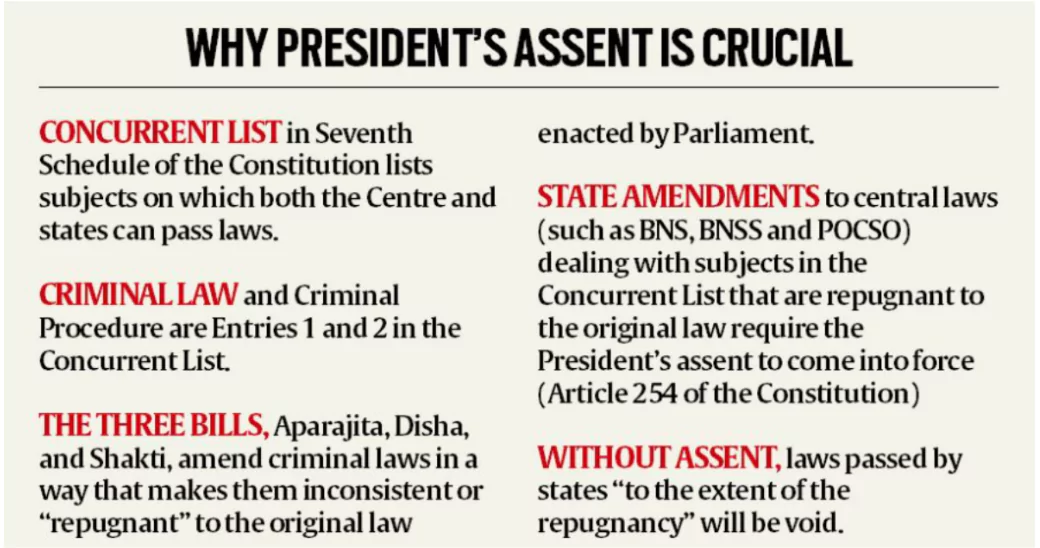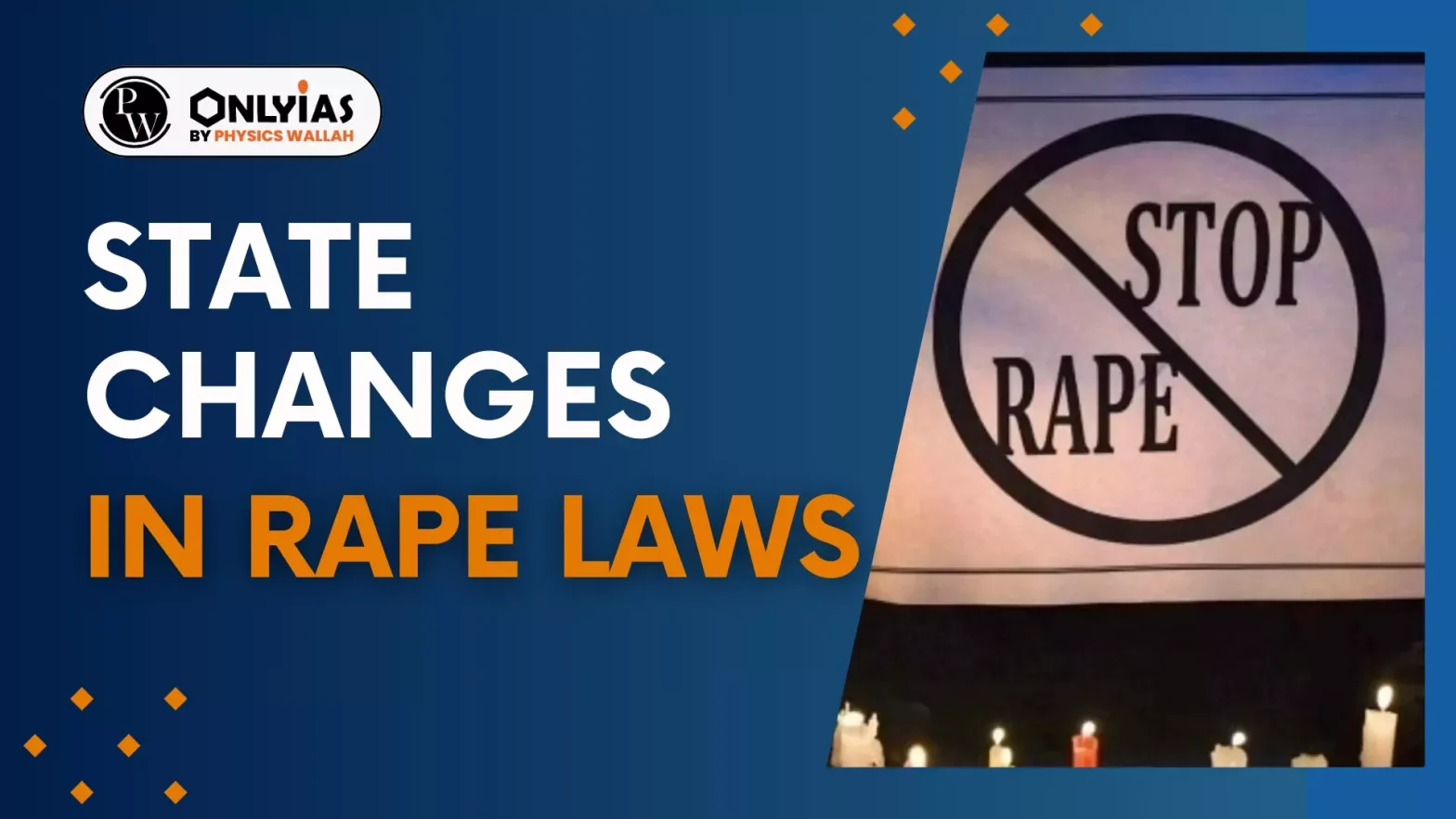The West Bengal Assembly has passed the Aparajita Woman and Child (West Bengal Criminal Laws Amendment) Bill, 2024 (Aparajita Bill).
Overview of State Bills and Laws on Rape
With protests against the rape and murder of a young doctor in Kolkata, the West Bengal Assembly has passed the ‘Aparajita’ Bill, introducing the death penalty for rape.
- Key Amendments: The Aparajita bill amends provisions of:
- Bharatiya Nyaya Sanhita, 2023 (BNS).
- Bharatiya Nyaya Suraksha Sanhita, 2023 (BNSS).
- Protection of Children Against Sexual Offences Act, 2012 (POCSO).
- Similar Bills: Before West Bengal, the Andhra Pradesh and Maharashtra Assemblies had passed laws prescribing the death penalty for rape.
- Earlier, the Madhya Pradesh and Arunachal Pradesh Assemblies had, in 2017 and 2018 respectively, introduced the death penalty for the rape.
Enroll now for UPSC Online Course
Can States Make Amendments To National Laws?
States can do this under Article 254(2) of the Constitution.
- Article 254(2): It permits a state legislature to pass a law that contradicts a central law on a matter in the concurrent list, but only if the state law receives presidential assent.
- This means that the state law will prevail in that state, even if it is different from the central law as long as it has been approved by the President.
- President Approval : The President goes by the advice of the central government.
- The President is under no obligation to give consent.
- There is no time limitation provided in the Constitution within which period this process has to be undertaken by the central government.

The Endemic of Rape in India
Rape is forced sexual intercourse, including vaginal, anal, or oral penetration, penetration may be by a body part or an object.
- Major Types Of Rape:
- Aggravated Rape: Occurs when the perpetrator holds a special position of authority or control over the victim.
- Crime of Rape and Murder: If during a rape, the accused causes such severe injury that the victim dies or falls into a vegetative state.
- Gang Rape: If a woman is raped by a group of people at the same time.
- Repeat Offenders: If a person is convicted of rape a second time.
- Findings of National Crime Records Bureau’s (NCRB) ‘Crime in India 2022’ Report: A total of 4,45,256 cases of crime against women were registered during 2022, showing an increase of 4.0% over 2021 (4,28,278 cases).
- Majority of cases were registered under ‘Cruelty by Husband or His Relatives’ (31.4%) followed by ‘Kidnapping & Abduction of Women’ (19.2%) and ‘Rape’ (7.1%).
- Findings of NCRB ‘Crime in India 2021’ Report: According to NCRB data, India registered 31,677 cases of rape in 2021 while nearly 49 cases of crime against women were lodged every single hour in 2021.
- The number of rape cases in 2020 was 28,046, while it was 32,033 in 2019.
- Among states, Rajasthan (6,337) was on top of the list followed by Madhya Pradesh (2,947), Maharashtra (2,496) and Uttar Pradesh (2,845), while Delhi recorded 1,250 rape cases in 2021.
- The rate of crime (per lakh population) for rape was highest in Rajasthan (16.4) followed by Chandigarh (13.3), Delhi (12.9), Haryana (12.3) and Arunachal Pradesh (11.1).
- The all-India average rate of crime stood at 4.8, according to the NCRB.
Check Out UPSC CSE Books From PW Store
Comparison of Bengal, Andhra, and Maharashtra Bills on Rape
Table comparing the West Bengal Aparajita Bill, Andhra Pradesh Disha Bill, and Maharashtra Shakti Bill:
| Criteria |
West Bengal: Aparajita Bill |
Andhra Pradesh: Disha Bills |
Maharashtra: Shakti Bill |
| Punishment for Aggravated Rape |
Imprisonment for life or death penalty. |
Death penalty for rape, gang rape, and repeat offenders. |
Death penalty for rape introduced. |
| Punishment for Rape Leading to Death or Vegetative State |
Mandatory death penalty. |
Death penalty. |
Death penalty for heinous rape cases. |
| Punishment for Gang Rape |
Also introduces Death penalty for gang rape of women above 18 year. |
Death penalty for gang rape. |
Death penalty for gang rape introduced. |
| Repeat Offenders |
Death penalty for repeat offenders. |
Death penalty for repeat offenders. |
Death penalty for repeat offenders. |
| Acid Attacks |
Rigorous imprisonment for life. |
Insufficient Data |
Death penalty for heinous acid attacks introduced. |
| Penalty for Assault Against Minor |
Death penalty for penetrative sexual assault. |
Death penalty for penetrative sexual assault against minors. |
Insufficient Data |
| Special Courts & Task Forces |
Special Aparajita Task Force and Special Courts for expeditious trials. |
Special Police Teams and Exclusive Special Courts for crimes against women. |
Special Courts and Special Inspector General of Police or Commissioner of Police |
| Timelines for Investigations |
Investigation to be completed in 21 days, extendable by 15 days. |
Expedited investigations and hearings with shortened timelines. |
Shortened timelines for investigation and trials. |
| Web Platforms/Data Sharing |
Insufficient Data |
Proposed a Women and Children Offenders Registry accessible to law enforcement. |
Obligates social media platforms to share data with investigating officers. |
Significance of State Bills and Laws on Rape
The steps taken by the states of West Bengal, Andhra Pradesh, and Maharashtra to introduce stringent laws represent significant legal and social impacts:
- Strengthening Deterrence: By prescribing the death penalty, these bills aim to act as strong deterrents against such heinous crimes.
- Faster Investigations and Justice: Special courts, task forces, and reduced timelines for investigation (such as 21 days in West Bengal) ensure swift justice, addressing one of the major concerns in rape cases—delayed trials.
- Expanded Legal Scope: These laws not only focus on rape but also expand their coverage to other forms of crimes against women, such as acid attacks. This ensures a more comprehensive approach to gender-based violence.
- Focus on Child Protection: By introducing the death penalty for penetrative sexual assault, these laws emphasize protecting children from sexual violence, which is a growing concern in India.
- Empowering Law Enforcement: Provisions such as the creation of task forces and women and children offenders’ registries strengthen the law enforcement agencies’ ability to track, investigate, and prevent crimes.
- For example, Andhra Pradesh’s law introduces a registry accessible to law enforcement, improving the ability to monitor offenders.
Check Out UPSC NCERT Textbooks From PW Store
Major Challenges Regarding the State Laws
- Legal Discrepancies Across States: If different states have varying degrees of punishments, this could create disparities in the administration of justice.
- Death Penalty Debate: There are concerns regarding human rights implications of the death penalty, especially given that several international organizations, including the United Nations, advocate for its abolition.
- Implementing state laws that introduce capital punishment for rape could lead to international scrutiny and pressure.
- Fragment Criminal Justice: If different states have varying degrees of punishments, this could create disparities in the administration of justice and the overall criminal justice system will become fragmented.
- Judicial Overload: The introduction shorter timelines puts additional pressure on the judiciary and law enforcement which may lead to delays in justice, even under expedited legal provisions.
Way Forward
- Ensuring Uniform Implementation: A crucial next step for West Bengal and other states with similar bills is to secure the mandatory presidential assent under Article 254(2) of the Constitution.
- Once the President’s approval is obtained, uniform implementation and adherence to these laws across the states should be ensured.
- Balancing Punitive Measures with Rehabilitation: While harsher punishments like the death penalty act as deterrents, there should also be a focus on rehabilitation for convicts who can reform.
- Life imprisonment with effective rehabilitation programs should be a parallel priority for cases that don’t qualify for the death penalty.
- Improving Investigation and Judicial Infrastructure: For the expedited trials, there needs to be adequate infrastructure, including the recruitment of judges, creation of special courts, and well-trained law enforcement agencies.
- Comprehensive Victim Support Systems: This includes psychological counseling, medical care, financial aid, and legal assistance for survivors and their families.
- Protecting the privacy and dignity of victims should be strictly enforced, especially in cases where the media may violate confidentiality norms.
- Public Awareness Campaigns: This includes educational programs in schools, colleges, and workplaces on gender sensitivity, legal awareness, and self-defense.
- Campaigns aimed at changing societal attitudes towards women and reinforcing respect for women’s rights are necessary.
- Gender-Sensitive Police Training: Regular training and sensitization programs for police personnel and law enforcement agencies are essential.
- Specialized training in handling sexual assault cases, ensuring a victim-centered approach will lead to better outcomes in rape cases.
- Collaboration Between States and Center: States should collaborate with the central government to ensure that these laws are in sync with national legal frameworks.
- A collective approach would result in harmonized legislation that addresses the socio-economic factors contributing to gender-based violence.
Enroll now for UPSC Online Classes
Conclusion
By focusing on these multi-dimensional strategies, India can move towards not just stricter laws but a society where rape and sexual violence are systematically prevented and justice is delivered in an effective and humane manner.
![]() 5 Sep 2024
5 Sep 2024


